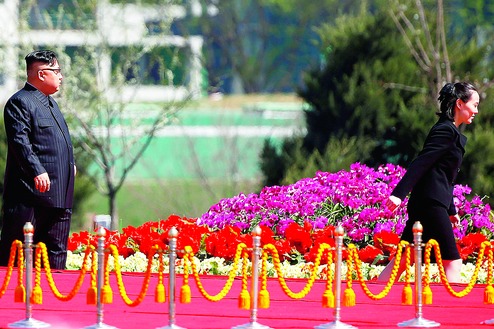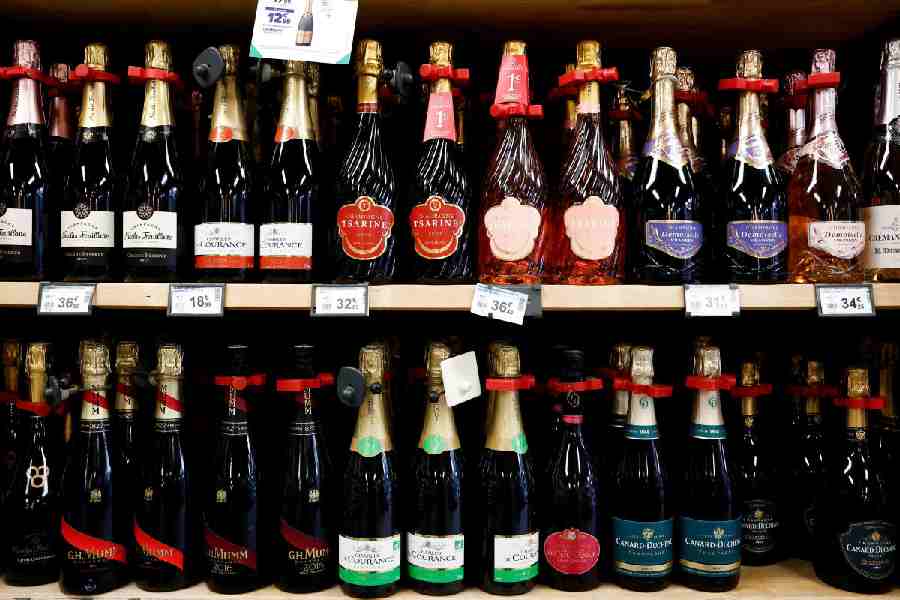
Sofia (Bulgaria), Oct. 8: While the embassies of most countries promote the interests of companies back home, North Korea's are in business for themselves.
A series of tough sanctions by the United Nations and an executive order recently signed by President Trump have sought to economically isolate the nuclear-armed regime of Kim Jong-un. But Pyongyang has held on to an array of profit-making ventures, some of which operate in the roughly 40 embassies of the hermit kingdom.
Many of these enterprises are hard to trace, but at least one is impossible to miss. For years, neighbours have complained about the noise coming from a large, fenced-in building here in a southern section of Bulgaria's capital city. It hosts parties a few times a week, many of them capped off with a late-night flurry of fireworks, shot from the roof.
"It isn't loud now," one neighbour, Bonka Nikolova, said as a parade of wedding guests filed into the building. "But if they paid for fireworks, there will be fireworks."
Nikolova has called the police, but there isn't much they can do. The building, filled with gilded halls that can be rented for events, enjoys a kind of diplomatic immunity courtesy of its owner: the government of North Korea.
North Korean embassies have spent decades running cash-raising schemes, nearly all of them illicit under current international law. Diplomats and their underlings have brokered deals for weapons and drugs, and more mundane products like machine tools and cows. They have also smuggled liquor, cigarettes, luxury cars and anything else that can be imported duty free and then sold at a gain.
"My late father-in-law was an ambassador," said Marcus Noland, who studies North Korea and is executive vice president of the Peterson Institute for International Economics, "and he told me that in India, years ago, it was known within the diplomatic corps that if you wanted to buy beef, you could knock on the backdoor of the North Korean embassy in Delhi. They ran an abattoir in the basement."
Earning money is a necessity for the embassies - North Korea doesn't fund them. Instead, they are expected to support themselves and send home any surplus.
Despite the sanctions it is under, North Korea did $6.5 billion in trade last year. Analysts estimate that embassy revenues represent a small sum compared with the country's other low-profile foreign ventures.
Those included cadres of bodyguards leased to dictators who don't trust their own citizens, labourers dispatched to work sites around the world who must remit their wages and state-owned companies that export ballistic missiles and other arms to countries like Syria. In some cases, diplomats get involved with weapons deals.
Diplomats for the country have been ad hoc entrepreneurs since at least 1976. That year, Norway's police found through surveillance that every member of the North Korean embassy in Oslo was involved in the import and sale of as many as 10,000 bottles of spirits and 100,000 cigarettes.
In Poland, 40 businesses are listed at the address of the North Korean embassy in Warsaw, including a pharmaceutical company, several advertising agencies and a yacht club.
In Sofia, the embassy owns a number of buildings on two separate properties. One is a complex that includes the embassy itself. The event space, known as Terra Residence, is a 15-minute walk east. It's the former home of the North Korean ambassador.
Terra rents out the space for magazine photo sessions, music videos and television ads"<> Its main business is weddings, proms and corporate events.
Few attendees, it seems, realise they are spending the evening on North Korean property.
"I knew it was a former embassy building, but I had no idea it was owned by North Korea," said Bilyana Dimitrova, who attended a friend's wedding at Terra in September. "The atmosphere was very pleasant."
A spokeswoman for Terra, Anelia Baklova, wrote in an email that the company has had a long-term lease with the embassy of North Korea that predates the imposition of economic sanctions. When the UN approved stricter sanctions, this year and last, Terra "froze" its payments, she said.
Emails to the embassy were not returned.











